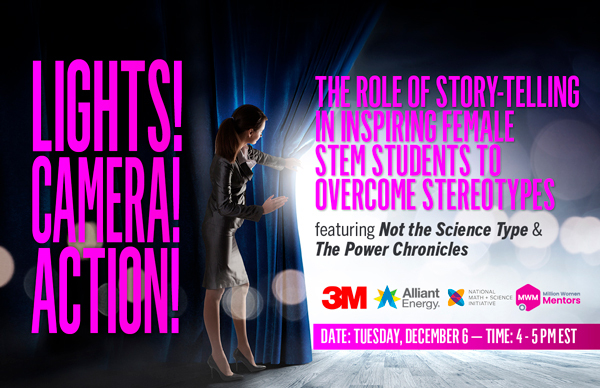Lights, Camera, Action! The Role of Story-Telling in Inspiring Female Students to Overcome Stereotypes and Pursue STEM Careers
Lights, Camera, Action! The Role of Story-Telling in Inspiring Female Students to Overcome Stereotypes and Pursue STEM Careers featuring Not the Science Type & The Power Chronicles.
The Power Chronicles tells the story of a middle-school aged, African-American girl named Akilah, who finds her power with the help of a professor, a pioneer of space travel, a solar tech inventor and other inspiring women mathematicians and scientists. Readers join the young STEM enthusiast Akilah on a journey through time to meet inspiring women mathematicians, scientists, inventors, and engineers. Girls and boys begin school with the same level of interest in STEM, but girls start losing interest in middle school. It’s important for girls to participate and see women at work in STEM to bolster their confidence and interest in these fields. The Power Chronicles brings STEM to life.
Not the Science Type is a four-part docuseries featuring four female scientists who are challenging stereotypes and confronting gender, racial and age discrimination as they rise to prominence in the fields of biology, engineering, science, and technology.
The panelists spoke about how the messages in each plays out at their jobs
- “We created this (The Power Chronicles) in the hopes that young people can see themselves in this book” said Julie Bauer, Executive Director, Alliant Energy Foundation. “If they see it, they can believe it”.
- “We aren’t going to remember numbers, we remember stories, it’s a big part of being human and connecting with each other,” said Robin Sempf, Director of Marketing and Creative Strategy, Alliant Energy. “Stories create an emotional connection, and uses a different part of the brain.”
- “One of the things about a story is you have to make it interesting,” said Barbara Lee Francisco, Artist, The Power Chronicles. “We gave them characters the young women would connect with and identify with both in looks and feelings.”
- “It’s an easier opportunity to start having the tough discussions when you’ve watched something to then talk about,” said Catherine Garland, NMSI Coach, AP Physics 1, National Math & Science Initiative. “It is so powerful for young girls to talk about their feelings and how people are perceiving them.”
- “What we know from the research is mentoring has a massive impact on girls and their trajectory on STEM”, said Jennifer Stancil, Director, Development, National Math & Science Initiative. “What we are trying to do is use storying telling as a device for young girls to see themselves in STEM.”
Watch the Replay:
